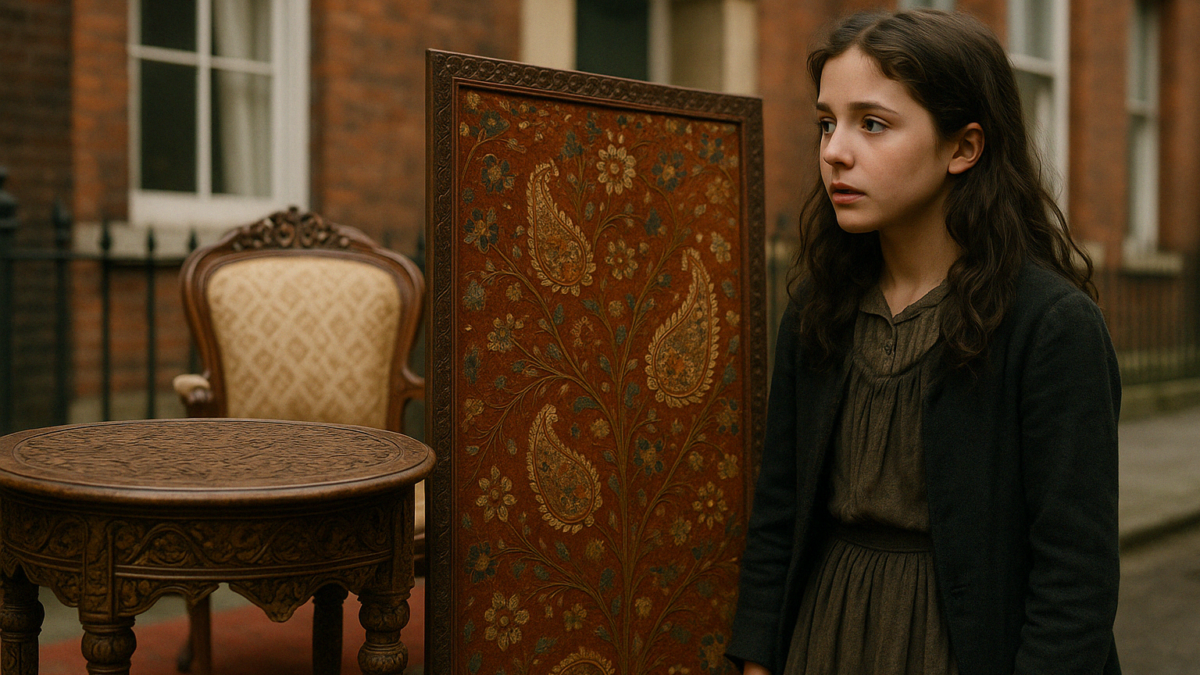※カラフル対訳で紹介している作品はすべてパブリックドメインです。
このサイトで使われている作品のすべては著作権の切れた名作などの全文を電子化して、インターネット上で公開しているProject Gutenberg(プロジェクト・グーテンベルク)、LibriVox(リブリヴォックス、朗読図書館)の作品を出典としています。
翻訳者:yasutama
カラフル対訳
The vans of furniture came and were unloaded and gave place to[~に席を譲る] others all the day.
一日中、家具を積んだほろ馬車が、やってきては(荷物を)降ろし、次のほろ馬車が来るという繰り返しをしていた。
Several times it so happened[たまたま~する] that Sara had an opportunity of seeing things carried in.
セーラも何度か、運び込まれた荷物を見る機会があった。
It became plain that she had been right in guessing that the newcomers[新来者] were people of large means.[資力,財産]
新しく引越してくる人たちが、金持ちであるという、セーラの推測が正しかったと明らかになった。
All the furniture was rich and beautiful, and a great deal of[かなり多くの] it was Oriental.
家具はどれも豪華で美しく、東洋風の荷物がかなり多かった。
Wonderful rugs[敷物, じゅうたん] and draperies[ひだのある掛け布] and ornaments were taken from the vans, many pictures, and books enough for a library.
素晴らしいラグやカーテン、装飾品がほろ馬車から下ろされ、沢山の絵や、図書館がいっぱいになるほどの本もあった。
Among other things there was a superb[実に見事な] god Buddha in a splendid shrine.[聖堂, 廟]
その他には、華麗な厨子に入れられた見事な仏像もあった。
“Someone in the family MUST have been in India,” Sara thought.
「家族の誰かがインドにいたに違いないわ」とセーラは思った。
“They have got used to Indian things and like them. I AM glad. I shall feel as if they were friends, even if a head never looks out of the attic window.”
「彼らは、インドのものに慣れ親しんでいて、好きなんだわ。嬉しいわ。たとえ、屋根裏部屋の窓から頭が見えなかったとしても、まるで友達のように感じるわ」
When she was taking in[自宅で引き受ける] the evening’s milk for the cook (there was really no odd job she was not called upon to do), she saw something occur which made the situation more interesting[事態をさらに面白くする] than ever.
セーラが、コックに言いつけられて、夕方のミルクを取りにでると(雑多な仕事で彼女が言いつけられない仕事など、実際なにもなかった)、これまで以上に面白いことが起こるのを見た。
The handsome, rosy man who was the father of the Large Family walked across the square in the most matter-of-fact[事もなげな] manner, and ran up the steps of the next-door house.
大家族の父親であるハンサムなバラ色の頬の男性が、あたりまえのことといった様子で広場を横切り、隣の家の階段を駆け上がった。
He ran up them as if he felt quite at home and expected[当然のこととして期待する] to run up and down them many a time in the future.
まるですっかり慣れた感じで駆け上がっていて、これからも何度も(階段を)駆け上がったり降りたりすることになるだろうことを熟知しているかのようだった。
He stayed inside quite a long time, and several times came out and gave directions to the workmen, as if he had a right to do so.
彼はかなり長い間家の中にいて、何度か出てきては、そうする権利があるのは当然といったふうに、作業員に指示を出していた。
It was quite certain[~ことを確信している] that he was in some intimate[親密な] way connected with[関係して] the newcomers and was acting for them.
彼が、新しく引越してくる人達と何らか親密なつながりがあって、その人たちのために行動していることは、間違いなかった。
“If the new people have children,” Sara speculated,[思索する]
「新しく引越して来る人たちに子供がいたら、」とセーラは考えた。
“the Large Family children will be sure to come and play with them, and they MIGHT come up into the attic just for fun.”
「大きな家族の子供達は、きっと遊びに来るわね。そうすれば、彼らは、面白がって屋根裏部屋に上がってくるかもしれないわ」
At night, after her work was done, Becky came in to see her fellow prisoner and bring her news.
夜、仕事が終わった後、ベッキーが囚人仲間のセーラに会いに来て、知らせを持ってきた。
“It’s a’ Nindian gentleman that’s comin’ to live next door, miss,” she said.
「隣に住むのは、ニンド人の紳士ですよ。お嬢様」と彼女は言った。
“I don’t know whether he’s a black gentleman or not, but he’s a Nindian one. He’s very rich, an’ he’s ill, an’ the gentleman of the Large Family is his lawyer.
「黒人の紳士かどうかはわかりませんが、ニンド人だそうです。大金持ちで、病気を患っています。それから、大きな家族の紳士が、彼の弁護士なんだそうです。
He’s had a lot of trouble, an’ it’s made him ill an’ low in his mind. He worships idols, miss. He’s an ‘eathen[hearthen] an’ bows down to wood an’ stone.
沢山の問題を抱えていて、病気になったそうです。精神的にも参っているそうです。偶像を崇拝してるそうです。お嬢様。彼は、異教徒で、木や石にひれ伏すんです。
I seen a’ idol bein’ carried in for him to worship. Somebody had oughter[brochure ?] send him a trac’.[tract] You can get a trac’ for a penny.” Sara laughed a little.
崇んでいる偶像が運ばれていくのを見ました。誰かが彼にパンフレットをあげるべきですね。1ペニーで(宗教上の)小冊子が手に入りますよ」セーラは少し笑った。
“I don’t believe he worships that idol,” she said; “some people like to keep them to look at because they are interesting.
「私はその人が偶像を崇んでいるとは思わないわ」とセーラは言った。「そういったものを眺めるのが好きで、持っている人もいるのよ。
My papa had a beautiful one, and he did not worship it.”
私のパパも、そういった美しい物を持っていたけど、それを崇んだりはしていなかったわ」
But Becky was rather inclined to[~したいと思う] prefer to[むしろ~のほうを好む] believe that the new neighbor was “an ‘eathen.”
しかし、ベッキーは、むしろその新しい隣人が「異教徒」だと信じたがっているようだった。
It sounded so much more romantic than that he should merely be the ordinary kind of gentleman who went to church with a prayer book.
そのほうが、祈祷書を持って教会に通うような、たんなる普通のタイプの紳士よりも、よっぽどロマンティックに思えたからだった。
She sat and talked long that night of what he would be like, of what his wife would be like if he had one, and of what his children would be like if they had children.
その夜、ベッキーは座りこんで、どんな人なんだろうか、もし奥さんがいたらどんな人だろうか、もし子供がいたらどんな子どもたちだろうか、などを長々と話し続けた。
Sara saw that privately she could not help hoping very much that they would all be black, and would wear turbans, and, above all, that—like their parent—they would all be “‘eathens.” [hearthen]
セーラはその様子を見て、ベッキーはお隣さんが全員が黒人で、ターバンを巻き、そして何よりも、親子そろって全員が「異教徒」であることを、心ひそかに願わずにはいられないのだと思った。
“I never lived next door to no ‘eathens[hearthen], miss,” she said; “I should like to see what sort o’ ways they’d have.”
「異教徒の隣に住んだことなんてないんですもの、お嬢様」とベッキーは言った。「どんなふうなのか見てみたいんです」
It was several weeks before her curiosity was satisfied, and then it was revealed that the new occupant had neither wife nor children.
ベッキーの好奇心が満たされるには数週間がかかった。新しい住人には、妻も子供もいないことが明らかになった。
He was a solitary man with no family at all, and it was evident that he was shattered in health and unhappy in mind.
彼は、家族のまったくいない孤独な男性で、健康を害し、精神にも悩みがあるのが明らかだった。
A carriage drove up one day and stopped before the house.
ある日、一台の馬車がやってきて、その家の前に止まった。
When the footman dismounted from the box and opened the door the gentleman who was the father of the Large Family got out first.
従僕が馬車の馭者席[箱]から降りてドアを開けると、大きな家族の父親である紳士が先に出てきた。
After him there descended a nurse in uniform, then came down the steps two men-servants.
その後、制服を着た看護師が降りると、ふたりの男の下男が階段を降りてやってきた。
They came to assist their master, who, when he was helped out of the carriage, proved to be a man with a haggard,[やつれた] distressed[苦しんでいる] face, and a skeleton body wrapped in furs.
ふたりは主人を助けるためにやって来た。主人がふたりに助けられて馬車から出ると、それはやせ衰えてひどく苦しんだ顔をしており、毛皮に包まれた体は骸骨のようであるのが分かった。
He was carried up the steps, and the head of the Large Family went with him, looking very anxious.
階段の上へと担ぎ込まれ、大きな家族の当主がとても心配そうに、隣の主人に同行した。
Shortly afterward a doctor’s carriage arrived, and the doctor went in—plainly to take care of him.
その後間もなく、医者の馬車が到着し、なかへ入って行った。彼の治療をするためなのは明らかだった。
“There is such a yellow gentleman next door, Sara,” Lottie whispered at the French class afterward.
「隣にすごく黄色い紳士がいるのよ。セーラ」と、ロッティーが、その後のフランス語の授業で囁いた。
“Do you think he is a Chinee? The geography says the Chinee men are yellow.”
「中国人だと思う?地理で、中国人は黄色いってと言ってたもん」
“No, he is not Chinese,” Sara whispered back;
「いいえ、彼は中国人ではないわ」とセーラは囁き返した。
“he is very ill. Go on with your exercise, Lottie.
「彼は重病なの。さぁ、お勉強を続けてね、ロッティ。
‘Non, monsieur. Je n’ai pas le canif de mon oncle.'”That was the beginning of the story of the Indian gentleman.
『いいえ、私は叔父のポケットナイフを持っていません』」これがインド人紳士の物語の始まりだった。

